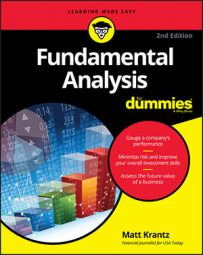Putting a price tag on a stock or bond
If you've ever wondered whether a stock is "cheap" or "pricey," fundamental analysis can be a big help. Fundamental analysis helps you understand exactly what you're getting when you buy an investment.Say you have the opportunity to buy a tree that literally grows dollar bills. Sounds great, right? How much should you pay for the tree? You might be tempted to pay millions of dollars, especially if others have their wallets out and start bidding.
But, fundamental analysis can help you intelligently put a price tag on this amazing plant. By asking some questions and doing some due diligence, you can actually arrive at a correct price. The farmer tells you the tree grows 20 one-dollar bills every month. He also says the tree will likely die in a year and then stop growing money. Lastly, the farmer promises to pay you $20 a month if, for any reason, the tree stops growing money in less than a year. Suddenly this tree that grows money doesn't sound so wonderful.
Knowing these fundamental details, the tree can be priced. You now know the tree is expected to generate about $240 over the next 12 months until it shrivels up and dies. So, is the tree worth $240? Not so fast. Remember, the tree won't grow the $240 right away. You have to wait a year to get the entire wad of cash — as you'll only harvest $20 a month. Because you have to wait a year to get the $240, the tree is worth less than $240. That's because of the time value of money — a key principle to fundamental analysis — which essentially means a dollar received now is worth more than one received tomorrow. So if there's a bidding war for the tree that drives the price over $240, you know to walk away based on your fundamental research.
Being profitable by being a "contrarian"
Being a successful fundamental analyst can be pretty lonely. If you're trying to make money from studying a company and determining the company is worth more than its stock price, you're betting that other investors bidding for the stock are wrong.Fundamental analysis, therefore, is somewhat at odds with the efficient market theory. Efficient market theory says that trying to beat the market by picking winning stocks is futile. The strong form of the efficient market theory says that all information that's knowable about a company is reflected in a company's stock price. So, let's say that after reading this book you dig through a company's financial statements and find that a company has great prospects. Efficient market theory would suggest that you're not the first person to discover this, and that other investors have already bid the stock up with the same information.
But before you throw your hands up and give up on fundamental analysis, there are some caveats to the efficient market theory worth noting. Most importantly, while stocks may reflect all information over the long term, there can be short-term periods when prices might excessively rise or fall due to extreme and fleeting optimism or pessimism. For instance, many high-technology stocks skyrocketed during the late 1990s, as investors bid up share prices on the idea that they'd be worth a fortune in the future. Fundamental analysts, looking at the fact many of the companies didn't make money and never would, avoided the dot-com bubble. Eventually, the fundamentals caught up to them and many of the stocks collapsed 90% or more. In some cases, the companies completely failed.
To profit from fundamental analysis, you have to be comfortable going against the crowd — or in Wall Street parlance — being a contrarian. When other investors are overly enthusiastic about a stock, they bid the price so high that it's practically impossible for anyone to make money. A contrarian would not be buying those stocks.

